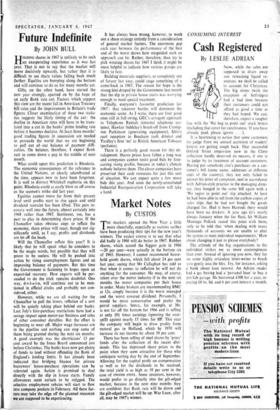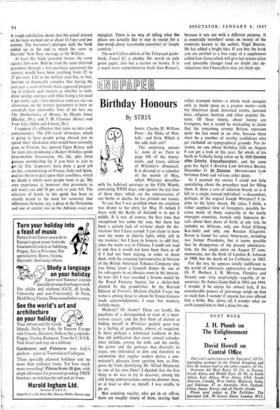Cash Registered
CONSUMING INTEREST
By LESLIE ADRIAN
Now, while the sales are supposed to drain away our remaining liquid re- sources, we shall be called to account for Christmas. The big stores (with the exception of Selfridges) had a bad time because their customers could not afford as good a time as they had hoped. We can, therefore, expect a tougher
line with the 'We beg to point out' stock letters (including that cover for carelessness, if you have already paid, please ignore . . .').
It is heartening to notice that some customers (to judge from my annual accretion of readers' letters) are getting tough back. That successful Oxford Street emporium now in the Clore collection hardly deserved its success, if one is to judge by its treatment of account customers. Having put somebody else's purchases on a cus- tomer's bill (same name, addresses at different ends of the country), they not only failed to answer his letter of complaint, sent in accordance with Adrian-style practice to the managing direc- tor, they banged in the same bill again with a 'We regret to point out' slip attached. At least he had been able to tell from the carbon copies of sales slips that he had not bought the goods charged for. Had it been Harrods there would have been no dockets. A year ago (it's nearly always January when the fur flies), Sir William Montagu Pollock raised this point with them, only to be told that 'when dealing with many thousands of accounts we are unable to alter the system to meet individual requirements.' How about changing it just to please everybody?
The attitude of the big organisations to the individual strikes me as more contemptuous than ever. Instead of ignoring you now, they lay on some highly articulate letter-writer to brush you gently into the files. Try, for instance, asking a bank about loan interest. An Adrian reader had a go, having had a 'personal loan' to buy a pre-fab garage. He borrowed f100 for a year, re- paying £8 6s. 8d. and 6 per cent interest a month. A rough calculation shows that the actual interest on his loan worked out at about 11.5 per cent per annum. The borrower's dialogue with the bank added up in the end to much the same as Harrods' New Year message to Sir William.
At least this bank customer knows the score against him now. Had he tried the same deferred payments through a hire-purchase agreement the interest would have been anything from 25 to 27 per cent. Life in the welfare state has, in fact, become so financially complex that during the past year a score of books have appeared purport- ing to explain such matters as whether to with- draw savings and pay cash (thus losing a tax-paid 4 per cent), sign a hire-purchase contract (no tax allowances on the interest payments) or have an overdraft (tax allowable). Two of the best are The Mathematics of Money, by Haydn Jones (Blackie, 30s.), and J. H. Clemens Money and Your Life (Allen and Unwin, 28s.).
I suppose it's affluence that taxes us into cash consciousness. The £50 travel allowance, which is going to have people going abroad just to spend 'their' allowance, who would have normally gone to Frinton, has spurred Egon Ronay and his team into producing a Budget Holidays guide (Automobile Association, 10s. 6d., plus three guineas membership fee if you have to join to get it). The 'inspectors' have done a good job on this, concentrating on France, Italy and Spain, and for the most part upon their coastlines, which no doubt is where most people want to go. My own experience is, however, that proximity to salt water can add 50 per cent to your bill. The selection of hotels in this guide has been so closely keyed to the need for economy that differences between, say, a place in the Dolomites and one of similar size on the Adriatic coast are marginal. There is no way of telling what the places are actually like to stay in except for a few words about 'reasonable amenities' or 'simple comfort.'
The new Collins edition of the Telegraph guide- book, Travel 67, a chunky 30s. worth on pale green paper, also has a section on money. It is a much more comprehensive book than Ronay's,
because it sets out with a different purpose. It is essentially travellers' notes on twenty of the countries known to the author, Nigel Buxton. He has added a bright idea. If you buy the book you are entitled to a free copy of a supplement called Late Extra which will give last minute price and timetable changes (and no doubt any de- valuations that Chancellors may yet think up).































 Previous page
Previous page